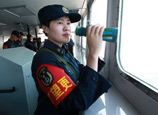
Since undergoing treatment for breast cancer in 2011, Ma Guifang has been singing her way to better health.
"It's a good way to vent my feelings,"said the 68-year-old retired music teacher, who runs a choir for fellow patients in Beijing.
"It keeps me busy, so I don't have time to worry too much about my health. I also get to know lots of people like me, and make good friends."
The choir was the brainchild of Wang Pilin, director of breast surgery at Tiantan Hospital and Ma's doctor, and is just one of the activities organized by a support group set up in 2006 to help about 1,000 people diagnosed with breast cancer.
According to the National Health and Family Planning Commission, 126,000 people are diagnosed with breast cancer every year.
"Breast cancer is the most-prevalent cancer among women in China,"Wang said, but only about 80 percent of patients survive for more than five years after treatment. "Some may well fear a relapse, while the obvious change in appearance caused by the surgery puts many under enormous stress."
In Wang's unit, doctors are asked to help patients build confidence with regular conversations and counseling.
Liu Lan is among those who have benefited from their support.
"Doctor Wang was always upbeat, and she helped my husband and I to see the bright side,"said the 55-year-old, who was diagnosed with breast cancer five years ago. "If my doctor had talked nothing but technical terms, I'd have been very depressed."
Wang's unit is devising a professional pattern of psychological intervention for breast cancer patients and studying its effects on recovery.
Mental health
Yet although more hospitals are realizing the importance of emotional support for cancer patients, few are actually receiving it.
"Many patients can't deal with the uncertainty of what the future holds and suffer problems such as insomnia, anxiety, depression and even nausea at just the thought of cancer treatment,"said Tang Lili, head of the recovery department at Beijing Cancer Hospital. "The pressure can also often disrupt their families."
She said her team focuses on identifying mental health issues among cancer patients or their relatives, and using drugs and counseling to alleviate them, as well as providing palliative care to ease physical pain.
A study that included 4,815 patients admitted to Beijing Cancer Hospital between September 2007 and January 2008 found 24 percent had a psychological issue, including depression and anxiety.
However, even working at one of the few hospitals in China with targeted psychological treatment for cancer patients, Tang said not all patients or medics agree with the methods.
"We've seen many patients deny psychological treatment, as they don't want to be labeled with a mental problem,"she said.
She also complained of inconsistency among the clinicians who evaluate a patient's mental state, which dictates whether intervention is necessary, and said some had even asked her why hospitals need to provide psychological care to people beyond medical help.
Although it remains unclear what effect intervention can have on recovery, Tang's colleague, Li Jinjiang, explained that the goal is to help people "let go"of the negative and to live a happy life.
Many patients feel scared because they are not kept informed about their progress, "yet clinicians say they already have a heavy workload, so don't have the time or energy to pay attention to a patient's mental health,"said Li, who is studying for a master's degree in psychology. "Some regard it as being outside of the main treatment."
In a group session with four lung cancer patients on Friday, he gave each a raisin and asked them to talk about how it looks, feels and tastes. It is an anti-anxiety exercise, he said.
"A raisin is small, but there are many details you may not have noticed,"he told them. "Life is also filled with details. Whenever you feel anxious or find it hard to concentrate, try observing something."
Bian Yuanzhen, 64, was one of the recovering patients. He said the class helped him to see his condition differently.
"Being able to talk to the doctor and hear his advice helps alleviate the fear,"he said. "I feel we're not alone now. There are people who care about us."
















 Man swims in flood to deliver food for pregnant wife
Man swims in flood to deliver food for pregnant wife


![]()
